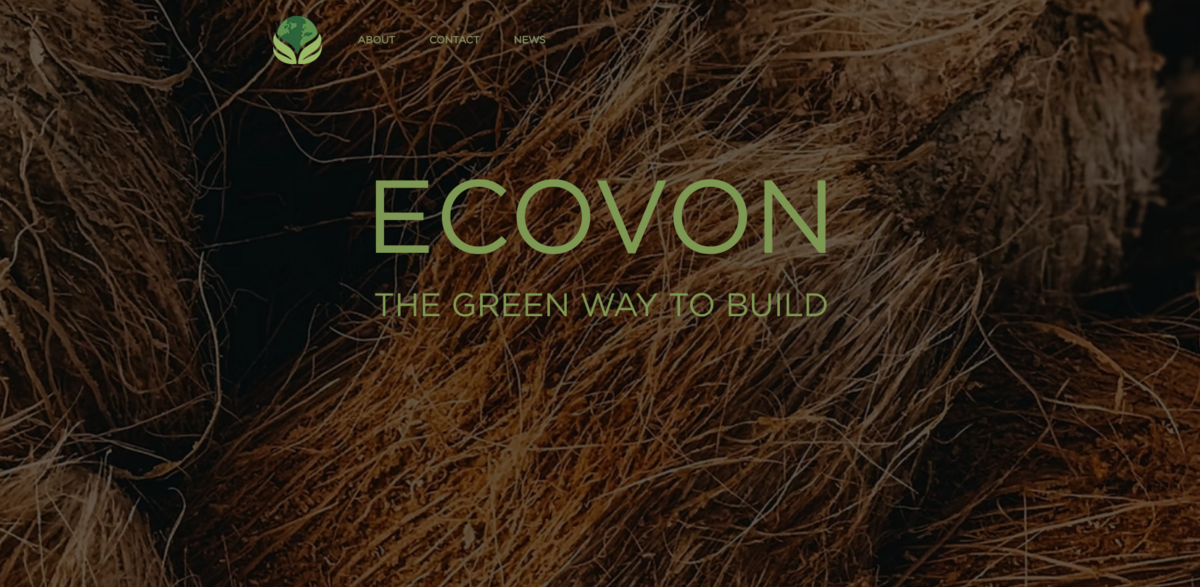What is Ecovon?
Ecovon is all about the green way to build – a revolutionary project that transforms coconut husk and sugarcane into a fully sustainable, naturally flame retardant, anti-fungal, binder‐free alternative to wood. The project stands out by making biodegradable building and packaging materials from coconut waste, paving the way for a cleaner, greener future. It’s a simple idea with a huge impact… turning waste into a resource and offering a natural alternative to traditional wood.
Main Benefits of Ecovon
The benefits of Ecovon are as compelling as they are innovative:
- Stronger & more durable than commercial wood-based panels
- Significantly less expensive than traditional wood
- 100% natural and compostable, unlike any other commercial wood
- Natural lignin content substitutes traditional carcinogenic binders
Eco-friendly Process
Ecovon’s process is both fascinating and remarkably efficient. The production begins with the careful harvesting of coconuts – a natural resource abundant in Ghana – and then the husk is separated with precision. It’s an almost poetic transformation: the husk is milled and dried before being hot-pressed into a final board. This process, free from harmful glues and carcinogenic binders, showcases a commitment to sustainability and environmental care… a truly green process from start to finish.
Sustainable Materials at Work
Utilizing coconut husk and sugarcane, two natural and renewable materials, Ecovon highlights the potential for sustainable production in building materials. This process taps into Ghana’s yearly 750,000 tonnes of coconut waste, reducing environmental impact and deforestation while creating a product that is both naturally flame retardant and anti-fungal. It’s a win-win situation: a full-circle approach that put coconut waste to productive use, serves as a healthier alternative, and decreases dependency on traditional wood that contributes to deforestation.
Market Impact and Innovations
The innovative nature of Ecovon’s approach speaks volumes about the future of building materials. By using natural lignin as a substitute for traditionally carcinogenic binders, this project is not only changing the way materials are produced but also impacting the market at large. The idea is simple – decreasing the need for harmful chemicals while producing a durable, cost-effective material. The project’s focus on profit without sacrificing the planet reflects a broader movement towards responsible production and consumption in today’s market… a leap of faith that is paying off for communities in developing countries.
Project Impact on SDGs
- SDG 12: Responsible Consumption and Production – Ecovon decreases deforestation and eliminates the use of harmful glues, encouraging sustainable use of resources.
- SDG 13: Climate Action – By developing a carbon neutral process for producing a wood alternative, the project contributes to mitigated climate change.
- SDG 15: Life on Land – With the aim to protect forests and put Ghana’s coconut waste to beneficial use, Ecovon helps preserve natural habitats.
- SDG 1: No Poverty – The initiative also provides a source of income for farmers in developing countries, supporting local economies.
Looking Forward to a Greener Future
The story of Ecovon is about coming together for the environment… It’s a vivid reminder that even the smallest pieces of waste can be transformed into something revolutionary and sustainable. At its core, the project operates under a powerful message: “African forests are being cut down at an alarming rate of over 4 million hectares per year; twice the world’s average. It’s clear that immediate action is required.” As citizens of Ghana – one of the world’s largest producers of coconut – stepped up to be the change they wanted to see, the project has set an inspiring example of innovation and environmental responsibility. The mission is simple, yet transformative: decrease deforestation, eliminate the use of harmful glues, and develop a carbon neutral alternative to wood, all while offering a healthier and economically viable product to the marketplace.






















